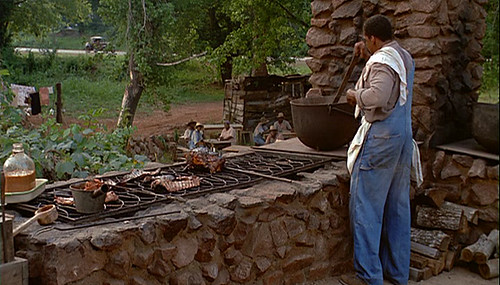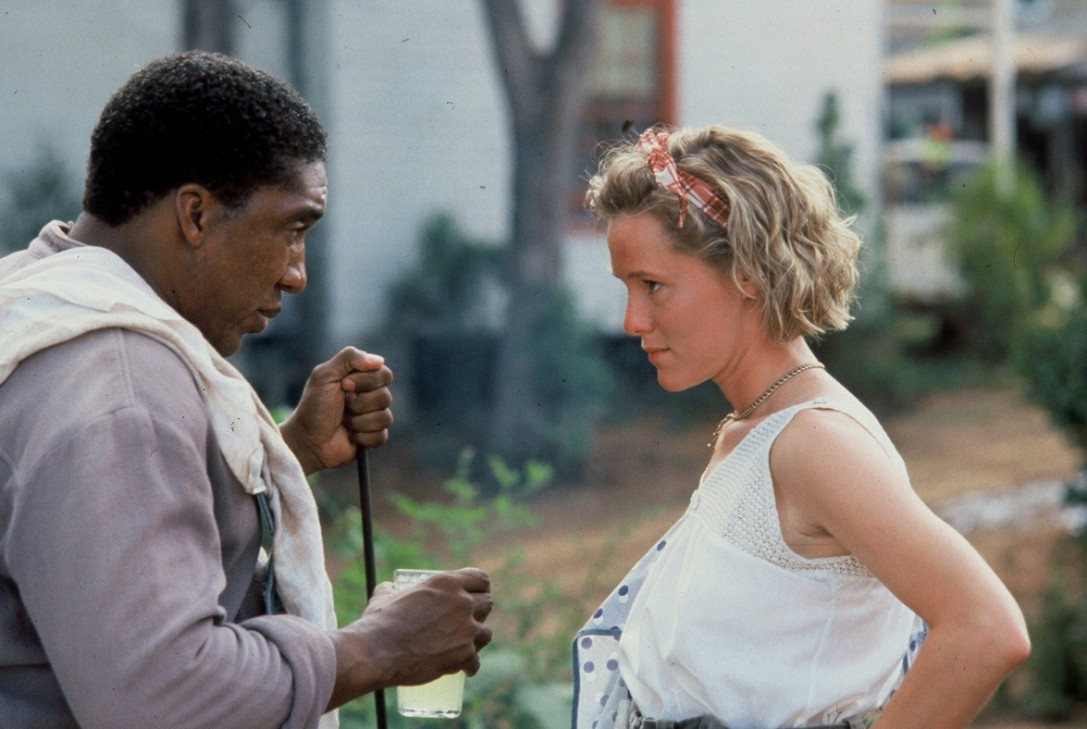
At first glance, Fried Green Tomatoes feels like a cozy Southern tale about friendship, resilience, and empowerment. But buried beneath its warmth lies a chilling mystery — one that still unsettles fans decades later. The infamous Smokehouse Secret remains one of Hollywood’s most quietly shocking twists, wrapped in charm, fried food, and small-town nostalgia.
What really happened behind those smokehouse doors in Whistle Stop, Alabama? Let’s revisit the film’s haunting undercurrent — the secret that turned a heartfelt story into a darkly poetic legend.
The Setting: Whistle Stop, Alabama — Where Charm Meets Shadows
Whistle Stop isn’t just a backdrop; it’s a character in itself. With its dusty roads, peach pies, and laughter drifting from the Whistle Stop Café, it seems almost too wholesome to hide a dark truth. Yet, behind the soft Southern drawls and summer sunlight, danger was brewing.
That’s what makes the Smokehouse scene so unforgettable — it contrasts warmth with something bone-chillingly human.
The Heart of the Story: Idgie, Ruth, and Their Unbreakable Bond
At its core, Fried Green Tomatoes is about the bond between Idgie Threadgoode and Ruth Jamison, two women who defied social norms of the early 20th century. Their friendship was deep, emotional, and transformative.
Together, they ran the café — feeding locals, helping neighbors, and standing tall in a time when women were expected to stay small. But when Ruth’s abusive husband, Frank Bennett, entered the picture, their story took a dark turn.

Frank Bennett’s Disappearance: The Beginning of the Mystery
Frank Bennett wasn’t just cruel — he was dangerous. His disappearance became the biggest mystery in Whistle Stop. The rumor mill churned: Did he run away? Did someone kill him?
And then there was the smokehouse — the quiet, unassuming shed behind the café that smelled of barbecue… and held a deadly secret.
The Smokehouse Scene: A Masterclass in Subtle Horror
The film never directly shows what happened to Frank Bennett, but the clues are unmistakable. The smokehouse, known for its delicious barbecue, becomes the center of suspicion. Lawmen come and go, the townsfolk whisper, and the café continues to serve its famous “special.”
What was that special, exactly? That’s where the movie’s subtle horror takes root. Without a single gory image, it suggests the unthinkable — Frank Bennett was killed and cooked in the café’s barbecue pit.
A Hidden Crime of Justice: Revenge Served Southern-Style
It sounds gruesome, but in the context of the story, it’s poetic justice. Ruth suffered under Frank’s cruelty for years. When Idgie finally helped her break free, Frank tried to take Ruth’s son away — a move that crossed an unforgivable line.
The implied murder wasn’t just revenge; it was protection. The smokehouse became a symbol of righteous rebellion, where justice was served the only way it could be in a world that ignored women’s cries for help.
Why the Scene Still Resonates Decades Later
Even thirty years on, the smokehouse mystery grips audiences. Why? Because it blurs the line between morality and survival. It forces us to ask: When society refuses to protect you, how far would you go to protect yourself or someone you love?
That’s the brilliance of Fried Green Tomatoes — it hides darkness within tenderness, making the story both heartwarming and haunting.
Idgie Threadgoode: Hero, Outlaw, or Both?
Mary Stuart Masterson’s portrayal of Idgie remains unforgettable — wild, fearless, and tender-hearted. She wasn’t just standing up for Ruth; she was standing up for every woman silenced by cruelty.
By the time the smokehouse secret unravels, viewers realize Idgie isn’t just a rebel — she’s a symbol of female resistance cloaked in Southern charm.
Ruth Jamison: The Quiet Strength Behind the Storm
Mary-Louise Parker gave Ruth a soft-spoken grace that balanced Idgie’s fiery energy. Her pain, resilience, and silent courage made her a compelling character.
The tragedy of her abuse and the quiet power of her recovery give emotional depth to the smokehouse mystery. Ruth wasn’t just a victim — she was the reason the Smokehouse Secret existed.
Barbecue and Symbolism: Food as a Vehicle of Storytelling
Southern food in the film isn’t just comfort — it’s communication. The barbecue, the fried green tomatoes, the café — they all carry meaning. The smokehouse barbecue became a metaphor for turning pain into strength, tragedy into triumph, and cruelty into community bonding.
In other words, food in Whistle Stop doesn’t just feed bodies — it feeds healing, even when the truth is hard to swallow.
The Ethics of Justice: Was It Right or Wrong?
This question continues to divide fans. Some see the act as murder; others as self-defense. The brilliance of Fried Green Tomatoes is that it never answers directly — it leaves you to wrestle with your own moral compass.
In many ways, the Smokehouse Secret asks a timeless question: When the law fails you, is it wrong to take justice into your own hands?
From Novel to Film: The Mystery Deepens
In Fannie Flagg’s original novel, the implication is even stronger — Frank Bennett was indeed cooked and served in the café’s famous barbecue. The film softened this for Hollywood audiences, but sharp-eyed fans still caught the subtext.
By toning it down visually, the movie made the story even more chilling — our imagination does the rest.
Southern Gothic Elements: Beauty Meets the Macabre
The story of the smokehouse fits perfectly within the Southern Gothic tradition — charming settings masking moral decay, ordinary people hiding extraordinary sins, and beauty sitting shoulder-to-shoulder with death.
It’s that delicate balance between sweet and sinister that keeps Fried Green Tomatoes alive in cultural memory.
How the Smokehouse Scene Changed Film Storytelling
Before Fried Green Tomatoes, few mainstream films blended female friendship, empowerment, and macabre mystery so seamlessly. It opened the door for nuanced storytelling — where women weren’t just victims or heroines, but layered human beings capable of both love and rage.
The smokehouse mystery gave the film depth — a narrative flavor that lingers long after the credits roll.
The Legacy of the Smokehouse Secret
Decades later, the Smokehouse Secret remains one of the most talked-about film mysteries. It’s been dissected in essays, fan theories, and film classes for years.
But maybe its true power lies not in what it reveals, but in what it doesn’t. It allows the viewer to decide what’s right, what’s wrong, and what survival really looks like.
Why We Can’t Stop Talking About It
Because it’s more than a mystery — it’s a mirror. The Smokehouse Secret reflects our darker instincts and our deep yearning for justice. It reminds us that sometimes the kindest people can carry the darkest truths — and that compassion and vengeance can live side by side.
Conclusion: The Secret That Time Couldn’t Bury
Fried Green Tomatoes might look like a comforting Southern classic, but underneath the laughter and love lies a haunting truth: every act of kindness can have a shadow, every meal can carry a story, and every smokehouse might hold a secret.
The film’s legacy endures not because of the food or the friendship — but because of that lingering question: What really happened in the smokehouse? And maybe, deep down, we already know.
FAQs
1. What is the Smokehouse Secret in Fried Green Tomatoes?
It’s the implied murder of Frank Bennett, Ruth’s abusive husband, whose body was rumored to have been cooked in the café’s smokehouse and served as barbecue.
2. Did Idgie Threadgoode really kill Frank Bennett?
The film never explicitly confirms it, but all clues point toward Idgie and her friends taking justice into their own hands to protect Ruth and her child.
3. Why didn’t the movie show the murder directly?
The decision to leave it ambiguous created stronger emotional and psychological tension, letting viewers imagine the horror instead of seeing it.
4. Is the Smokehouse scene in the book different from the movie?
Yes. The book makes the fate of Frank Bennett much clearer, while the movie subtly implies it — making it both less graphic and more mysterious.
5. Why does the Smokehouse Secret still fascinate fans today?
Because it challenges morality. It blurs good and evil, asking whether vengeance born from love can ever be truly wrong.
